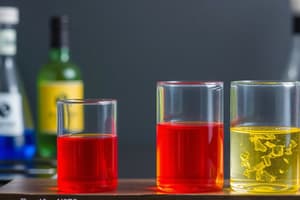Podcast
Questions and Answers
What is the result of a species gaining electrons during a redox reaction?
What is the result of a species gaining electrons during a redox reaction?
- No change in its oxidation state
- A decrease in its oxidation state (correct)
- An increase in its oxidation state
- A loss of electrons
What is the primary purpose of electroplating?
What is the primary purpose of electroplating?
- To alter the color of a material
- To increase the electrical conductivity of a material
- To enhance the mechanical properties of a material (correct)
- To remove impurities from a material
What occurs at the anode in an electrolytic cell?
What occurs at the anode in an electrolytic cell?
- Reduction occurs
- Electrolysis occurs
- Oxidation occurs (correct)
- Electroplating occurs
What is the primary product of the Chlor-Alkali process?
What is the primary product of the Chlor-Alkali process?
What is the purpose of electrolysis in water purification?
What is the purpose of electrolysis in water purification?
What is the primary application of electrolysis in the production of aluminum?
What is the primary application of electrolysis in the production of aluminum?
Flashcards are hidden until you start studying
Study Notes
Oxidation and Reduction
- Oxidation: loss of electrons by a species, resulting in an increase in oxidation state
- Reduction: gain of electrons by a species, resulting in a decrease in oxidation state
- Oxidation Number: a number assigned to an atom in a molecule to indicate its degree of oxidation
- Redox Reactions: chemical reactions involving oxidation and reduction, often accompanied by the transfer of electrons
Electroplating
- Electroplating: a process in which a thin layer of a material (e.g., metal) is deposited onto the surface of another material using an electric current
- Electrolytic Deposition: the process of depositing a substance onto an electrode using an electric current
- Uses: decorative plating, protective coating, and to enhance the mechanical properties of materials
Electrolytic Cells
- Electrolytic Cell: an electrochemical cell that uses an external electrical energy source to drive a chemical reaction
- Components: an anode, a cathode, and an electrolyte
- Reaction: oxidation occurs at the anode, and reduction occurs at the cathode
- Types: voltaic cells, electrolytic cells, and fuel cells
Industrial Applications
- Chlor-Alkali Process: the production of chlorine and sodium hydroxide through the electrolysis of sodium chloride (common salt)
- Aluminum Production: the extraction of aluminum from its ores through electrolysis
- Water Purification: electrolysis used to remove impurities and minerals from water
- Hydrogen Production: the production of hydrogen gas through the electrolysis of water, used as a clean energy source
Oxidation and Reduction
- Oxidation is the loss of electrons by a species, resulting in an increase in oxidation state
- Reduction is the gain of electrons by a species, resulting in a decrease in oxidation state
- Oxidation number is a number assigned to an atom in a molecule to indicate its degree of oxidation
- Redox reactions are chemical reactions involving oxidation and reduction, often accompanied by the transfer of electrons
Electroplating
- Electroplating is a process in which a thin layer of a material (e.g., metal) is deposited onto the surface of another material using an electric current
- Electrolytic deposition is the process of depositing a substance onto an electrode using an electric current
- Electroplating is used for decorative plating, protective coating, and to enhance the mechanical properties of materials
Electrolytic Cells
- An electrolytic cell is an electrochemical cell that uses an external electrical energy source to drive a chemical reaction
- Components of an electrolytic cell include an anode, a cathode, and an electrolyte
- Oxidation occurs at the anode, and reduction occurs at the cathode
- Types of electrolytic cells include voltaic cells, electrolytic cells, and fuel cells
Industrial Applications
- The chlor-alkali process involves the production of chlorine and sodium hydroxide through the electrolysis of sodium chloride (common salt)
- Aluminum production involves the extraction of aluminum from its ores through electrolysis
- Electrolysis is used in water purification to remove impurities and minerals from water
- Hydrogen production involves the production of hydrogen gas through the electrolysis of water, used as a clean energy source
Studying That Suits You
Use AI to generate personalized quizzes and flashcards to suit your learning preferences.




